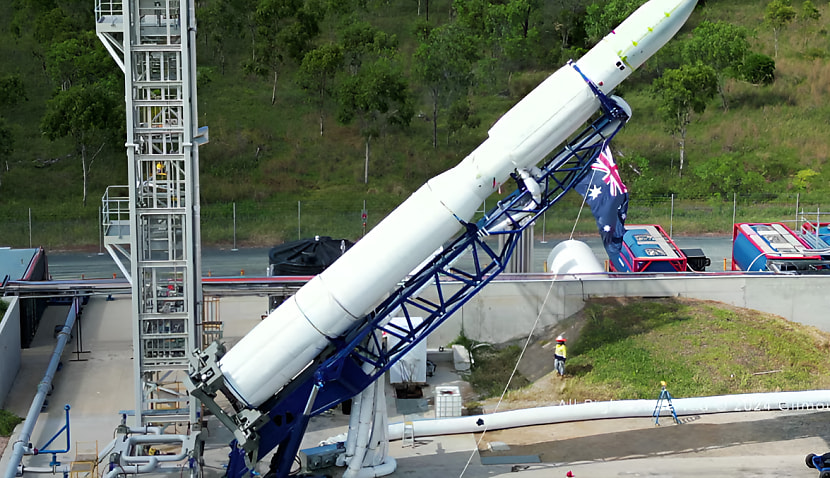
However, founder Adam Gilmour has told the ABC his team believe it’s unlikely it will fully achieve its mission objective to pass over the Coral Sea and enter low-Earth orbit.
“The first attempts at launches, they’ve always failed, so history is not on our side and we do expect something will go wrong,” he said.
“Our technology is quite benign in terms of explosive potential, but there’s still a risk whenever you’ve got a lot of pressure in a tank. If it explodes, things fly out a long way.”
Gilmour has been developing its three-stage launch vehicle for eight years and hopes to address a gap in the global market for small satellite launch providers.
Last month, the firm’s Bowen Orbital Spaceport in North Queensland was granted a licence to operate, though a blast-off cannot take place without an additional launch permit granted by the Australian Space Agency.
Gilmour already employs more than 100 people and hopes to increase its headcount to more than 300 by mid-2027.
It’s one of several businesses in Australia building spaceports for either its own or clients’ rockets, with Gilmour facing competition from ELA’s Arnhem Space Centre in the Northern Territory and Southern Launch’s Orbital Launch Complex in Southern Australia.
The news that Gilmour is inching closer to launch comes a month after the full text of the landmark deal that will allow more US rockets to blast off from Australian spaceports was released.
The Technology Safeguards Agreement (TSA) has also been tabled in Parliament and will be subject to an inquiry examining its potential benefits and challenges.
Currently, launching US spacecraft in Australia is difficult, given concerns about protecting sensitive US technology. However, the TSA will remove many of the barriers faced by firms in both countries.
Joel Lisk, a research associate in space law at Flinders University, said the TSA is a “complex document” because it protects US technology but contains advantages over similar deals agreed with the UK and New Zealand.
“The TSA imposes significant supervision, disclosure and compliance requirements on the Australian government and any business seeking to provide services to US companies,” he explained.
“This includes the establishment of ‘controlled’ and ‘segregated’ areas within Australia restricted to US citizens and people approved by the US, restrictions on who can examine US technology when it is brought into Australia, and limitations on the countries Australia (and Australian businesses) can deal with or provide space-related services to.
“The UK and NZ also have TSAs with the US to enable space businesses to go to those jurisdictions, but in a welcome development, it appears that not all restrictions in those agreements have been applied to Australia.
“This included restrictions on the ability for New Zealand to develop its own rocket technology that have not been carried over to the Australian TSA as this would have had substantial negative impacts on the existing Australian space sector.
“The TSAs in place in the UK and NZ have both facilitated launches from those jurisdictions.”
Adam Gilmour, though, has been a vocal critic of the agreement, arguing the segregated areas rule effectively reduces local companies to “renting out concrete pads” and “providing morning coffee to our American friends”.

Adam Thorn
Adam is a journalist who has worked for more than 40 prestigious media brands in the UK and Australia. Since 2005, his varied career has included stints as a reporter, copy editor, feature writer and editor for publications as diverse as Fleet Street newspaper The Sunday Times, fashion bible Jones, media and marketing website Mumbrella as well as lifestyle magazines such as GQ, Woman’s Weekly, Men’s Health and Loaded. He joined Momentum Media in early 2020 and currently writes for Australian Aviation and World of Aviation.
Receive the latest developments and updates on Australia’s space industry direct to your inbox. Subscribe today to Space Connect here.












